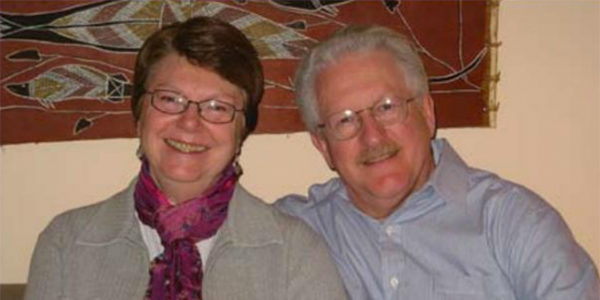Meet David and Pat Meyer

My wife Pat and I both grew up in Iowa, though on opposite sides of the state. Pat was a small-town girl, whereas I was a city boy from Cedar Rapids. We share the loss of a parent in early childhood: Pat's father died after a very long illness when she was five, whereas my parents divorced when I was eleven months old. Though I saw my father a few times a year, I, like Pat, was basically raised by a single mother in the forties and fifties. Both of us grew up in small Methodist churches that were important parts of our formative years. As I entered high school, my mother and I moved to the Chicago suburbs, cementing my identity as an urban person. Both Pat and I have fond memories of our teen years in MYF.
After three semesters as a theatre major at Illinois Wesleyan (where I first encountered Paul Hessert), I transferred to the University of Northern Iowa. Pat and I met in Humanities Class where she sat next to me. She remembers, though I do not, my dominating a discussion group of which she was the assigned leader. Nevertheless, she became interested in me, hinting that the development of our relationship might possess an element of divine ordination. It seems to have worked, as we've been married since undergraduate school.
At this point in our story, Paul Hessert reappeared, having moved from IWU to become a professor at Garrett. A little more than a year after our marriage, with the Vietnam War raging, we went to see Paul. We were weighing options, as I knew that I would not, under any circumstances, contribute to a war effort we both believed to be not only misguided, but downright malevolent. I wondered if such a concern was a sufficient reason to go to seminary. Paul's reaction was, "Try it for a year. If you don't like it, you can always leave." Another encounter with divinity?
Probably, as my first year at Garrett hooked me. I remember coming home to our one room apartment and saying to Pat, "I feel like I'm being initiated into
western civilization!"
Not that our undergraduate education had been weak, quite the contrary, yet somehow courses in Early Church History, Christian Art, Pastoral Care, The
Prophets, The Gospels, and Systematics seemed to draw together the disparate elements of the world into something coherent, exciting, even, as I later came
to understand, redemptive.
During that first year at Garrett, Pat and I, inveterate liberals, became Unitarians, so I left, first to finish my M.A. in English (dramatic literature and writing) while Pat completed her teaching degree in English, then to go to Meadville Theological School at the University of Chicago, and finally to serve a Unitarian congregation in Madison, Wisconsin. The latter experience convinced me that I was not meant for parish ministry, though faith and theology still held my attention in compelling ways.
So, after a brief political sojourn in the McGovern campaign, I returned to Garrett and Paul Hessert, intending to do a Ph.D. in theology with a Northwestern cognate field in theatre performance. This dual emphasis baffled the theatre people, although Paul thought it completely coherent, as did I. Still, after a couple of years, I realized I was spending a long time and a great deal of effort to prepare myself for unemployment. After significant internal struggle I entered the world of publishing, becoming the manager of the Garrett book store. It wasn't long before I realized that my literary, theatrical, and theological backgrounds made sense only in theological publishing. How had I managed that?
Thus, began a thirty-year career, most of it spent self-employed. Some of you may remember from the late 80s, Meyer-Stone Books, a publishing house of which I was the principal that published several Garrett authors. We were scheduled to do Hessert's ground-breaking C hrist and the End of Meaning but didn't manage to get it out before we had to sell as a result of the Federal Reserve bailout of Continental Bank. That was an agonizing time, when I wasn't sure if I would have work, retain our house, or remain married to Pat.
She stuck with me, another providential moment in my life.
I retired from publishing in 2004 and Pat retired from teaching (after having been first English Department Chair, then Assistant Principal) in 2007. Since my retirement, I have pursued a writing career (over the last 40 years I've published about 80 poems and several essays). I now am back to playwriting, which was what I wanted to do when I first went to Wesleyan in 1961, but whether I'll find success remains to be seen. It's no accident that there are only about 15-20 major playwrights in the history of theatre! Another opportunity for Providence?
Pat and I have been pleased to include Garrett-Evangelical in our will as one of our two primary legatees. This is in acknowledgement of the incredibly central place the seminary has played in our lives and my career. Without my wonderful experience of people like Paul Hessert, Morris Taggart, Ron Lee, Al Sundberg, Sam Laeuchli, Charlie Kraft, John Batsel, Wolfgang Roth, and John Hinkle, not to mention many fellow students, my life not only wouldn't have been the same, I would have been a lesser, shallower person.
I only hope that our legacy at Garrett-Evangelical helps to deepen the lives of later generations at the seminary and, by extension, in the church of the future.
Garrett-Evangelical is grateful to David and Pat Meyer for their generous stewardship. If you would like to leave a legacy at Garrett-Evangelical, visit our website, PlannedGiving.Garrett.edu, or contact David Heetland at 847.866.3970.


